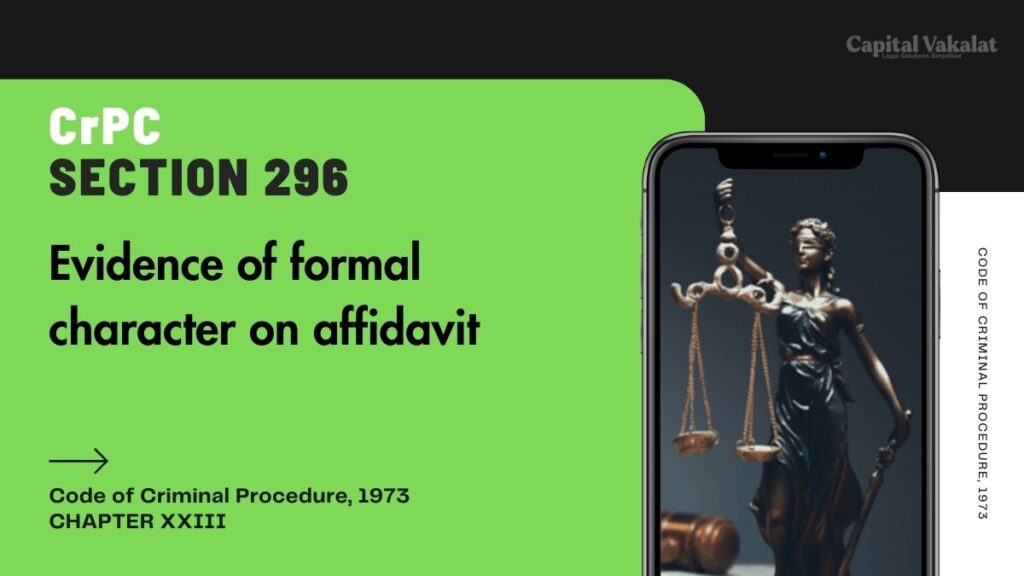Section 296 CrPC: Evidence of Formal Character on Affidavit has substantial significance in the Indian judicial system. This article delves into the intricacies of Section 296 of the Code of Criminal Procedure (CrPC), shedding light on its application, benefits, and the procedural nuances involved. By understanding this section, legal professionals and the general public can better appreciate the role affidavits play in judicial proceedings.

The legal framework in India is vast and intricate, comprising numerous laws and provisions aimed at ensuring justice. Among these, the Code of Criminal Procedure (CrPC) serves as a critical procedural law, governing the process of criminal trials. Section 296 CrPC specifically deals with the evidence of formal character presented on an affidavit, streamlining certain aspects of criminal trials. This provision helps reduce the burden of oral testimonies in court by allowing affidavits for formal evidence, thereby expediting the judicial process.
Bare Act. Section 296 Cr.P.C.
Evidence of formal character on affidavit.
(1) The evidence of any person whose evidence is of a formal character may be given by affidavit and may, subject to all just exceptions, be read in evidence in any inquiry, trial or other proceeding under this Code.
(2) The Court may, if it thinks fit, and shall, on the application of the prosecution or the accused, summon and examine any such person as to the facts contained in his affidavit.
Exploring Section 296 CrPCBare Act. Section Cr.P.C.
Section 296 CrPC states that evidence of a formal character may be given on affidavit if the court permits it. This section provides an alternative to oral evidence, which can often be time-consuming and cumbersome. The affidavits must be sworn before a competent authority, ensuring their authenticity and reliability.
The Importance of Formal Character Evidence
Formal character evidence typically includes official documents, routine records, and other non-contentious matters. By allowing these documents to be submitted as affidavits, Section 296 CrPC significantly reduces the need for witnesses to appear in person for undisputed facts. This provision is particularly beneficial in cases where the evidence pertains to procedural aspects rather than the core issues of the case.
Procedure for Submitting Affidavits under Section 296 CrPC
The process of submitting affidavits under Section 296 CrPC involves several steps to ensure the evidence is admissible and reliable. The party intending to use the affidavit must file a petition before the court, seeking permission. Upon granting permission, the affidavit must be sworn before a judicial officer or any other authorized person. The affidavit should then be submitted to the court as part of the official record.
Benefits of Using Affidavits in Judicial Proceedings
The use of affidavits under Section 296 CrPC offers several advantages:
- Efficiency: Reduces the time and resources spent on recording oral evidence.
- Convenience: Facilitates the submission of routine, non-disputed evidence.
- Reliability: Affidavits sworn before a judicial authority ensure authenticity.
- Cost-effective: Minimizes expenses related to court appearances and witness fees.
Challenges and Limitations
Despite its benefits, the application of Section 296 CrPC is not without challenges. The primary concern is ensuring the authenticity of affidavits. There is also the risk of affidavits being contested, necessitating further scrutiny. Additionally, the discretionary power of the court in accepting affidavits can lead to inconsistencies in application.
Real-life Applications and Case Studies
To understand the practical implications of Section 296 CrPC, examining real-life cases where this provision has been applied is crucial. One notable case involved the submission of medical records as affidavits, which streamlined the trial process significantly. By analyzing such instances, one can appreciate the practical benefits and potential pitfalls of using affidavits in judicial proceedings.
Conclusion
Section 296 CrPC: Evidence of Formal Character on Affidavit plays a pivotal role in the Indian judicial system, offering a streamlined and efficient method for presenting certain types of evidence. While it presents numerous benefits, it also comes with its own set of challenges that require careful consideration. By understanding and effectively utilizing this provision, legal professionals can enhance the efficiency and effectiveness of judicial proceedings.